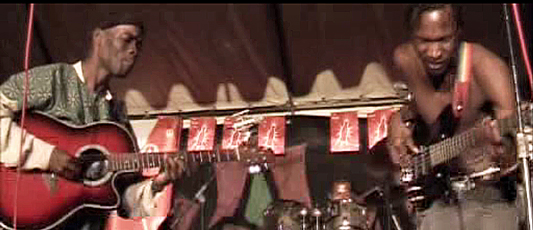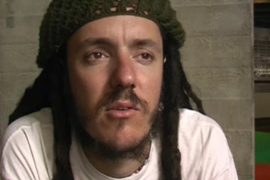
Harare’s open cafe culture
People & Power visits a venue described as an oasis of free speech in Zimbabwe.
 |
| Live music has long been a key part of life in Harare |
Elections in Zimbabwe on March 29 are once again expected to be won by the country’s long-term president, Robert Mugabe who is accused by his critics of suppressing any opposition and limiting free speech.
However, filmmaker Eugene Ulman visited the capital Harare and found one cafe locals say serves as an oasis of truly open expression.
Following independence in 1980, the Zimbabwean capital Harare began to emerge as an urban hub for central and southern Africa.
Keep reading
list of 4 itemsInside the pressures facing Quebec’s billion-dollar maple syrup industry
‘Accepted in both [worlds]’: Indonesia’s Chinese Muslims prepare for Eid
Photos: Mexico, US, Canada mesmerised by rare total solar eclipse
It had a film industry, theatres, art galleries, restaurants and even a stock exchange, with a busy calendar of annual arts events like the film festival, the international arts festival, the jazz festival and the book fair.
For over 20 years Harare was known not only as a cultural city, but also as a friendly and unpretentious place.
In recent years the mood has changed drastically in the city and the exuberance of the 1980s and the stoic optimism of the 1990s have been replaced with quiet despair.
The effect of chronic hyperinflation in Zimbabwe is that life has become extremely unpredictable – prices can double overnight with no warning, which often makes it impossible for people plan their lives even a week in advance.
The stress is clearly visible everywhere and most people have little time for luxuries such as culture and self-expression.
| People & Power | ||
|
But the role of the arts in the city is as crucial as ever and because the only radio and TV broadcaster in the country is state-owned ZTV, live performances play a crucial role in getting alternative voices heard.
Harare has always had a huge appetite for live music, and even in the most difficult times you can still find a band 7 nights a week.
But with the power cuts and beer shortages venue after venue is shutting down. The ones that survive often feature escapist light entertainment. Such escapism is popular given the daily hardships many Zimbabweans are forced to endure.
Alternative centre
The issue of freedom in Zimbabwe is often confusing, especially for an outsider.
Television and radio naturally present a government’s perspective on things, but there are private newspapers in Zimbabwe which openly and explicitly criticise the country’s leadership.
Political discussions and debates can often be very free and open but there is an intense paranoia when it comes to any kind of cameras, photography or video.
It is almost impossible to film any images in public without being approached by plainclothes officers.
But one venue is different – a simple looking place called the Book Cafe upstairs at the Fife Avenue shopping centre in Inner-City Harare.
Since it opened a decade ago, the Book Cafe has developed into the epicentre of Harare’s alternative culture and six nights a week the venue attracts a diverse and unpredictable audience of young artists, students, government workers, lawyers, doctors, bankers, businesspeople, street kids and diplomats.
 |
| Paul Brickhill says the cafe has no official political slant |
The events might involve music, poetry, theatre, comedy, discussions or competitions – but they have one thing in common in that there is strictly no censorship.
“Its not that as though it has a political slant, it’s just that it is open, you can say what you want,” Paul Brickhill, the cafe’s founder, says.
His son Tomas, a musician, explains that the point of the cafe is not just that you can criticise the government when performing but also speak in favour of it.
“Either way no one’s going to beat you up when get outside,” he says. “Well, most of the time at least.”
The Book Cafe began its life as a bookshop called Grassroots Books, founded by Paul in the early years of independence.
Before then, any remotely left-wing books – including most African writing – was banned and the mission of the new shop was to make progressive books available to ordinary Zimbabweans.
‘Diverse mix’
“Literally people streamed in and we sold every book we had in stock,” Paul recalls. “I specifically remember a truckload of military guys in their fatigues queuing outside because they had heard there were progressive books there.”
He says from the very start the cafe became a meeting point for people from across Zimbabwe’s racially mixed social spectrum.
“You would see someone you knew was a white farmer talking to a black radical gender activist and wonder what that conversation could be about.”
Samm Farai Monro, a white performance poet better known as Comrade Fatso claims “there is nowhere in the country with such a diverse mix of people”.
Mashasha, a black musician, was apprehensive that he would fit in when he first performed at the cafe.
“But to my surprise it was a different atmosphere when I got there,” he says. “It is hard to see class – it is just people enjoying what they are doing.”
| There is a saying in Zimbabwe: ‘Freedom of expression but no freedom after expression’ |
“Maybe after, when one starts to walk home and someone else jumps in their posh car – that is the only time you might see class.”
However given such an atmosphere it was only a matter of time before the Book Cafe attracted the attention of the Zimbabwean secret police, the CIO.
Most of the time performances at the Book Cafe go unhindered, but there are exceptions.
Victor Mavedzenge, a painter, poet and one of Zimbabwe’s most popular comedians first came to the Book Cafe eight years ago, to perform his poems at the regular Monday open mic night.
During a recent performance, Victor, his comedy partner and the person filming their show were all arrested.
Blacklist fear
“After the show we had about seven guys come backstage and say ‘we are going to have to ask you to come to the central police station,'” he says.
“They said that someone had called them to say we were saying something subversive about the government.”
But ultimately what scares the musicians more than the threat of arrest or harassment, is the possibility that they might not be able to make a living if they get blacklisted from relatively well-paid government-funded work.
“That’s the joke in Zimbabwe, you’ve got freedom of expression but you don’t have freedom after expression,” Comrade Fatso says.
But for artists, whichever aspect of daily life they might want to touch on, it is hard to avoid stepping out of line.
“In Zimbabwe anything you can think about singing about is somehow connected to the [political] situation that is happening,” Mashasha says.
However there has always been pressure on the artists from the Zimbabwean public to speak on their behalf, and some musicians see is as a vital part of their role.
 |
| Comrade Fatso says the cafe attracts the most diverse crowd in Zimbabwe |
“People are looking to the musicians to express what is really happening, because the media and the politicians aren’t doing it,” Chiwoniso Mararire, the country’s most popular female singer, says.
Indeed the Book Cafe may be the most effective social laboratory for a Zimbabwe of the future.
Despite rare opposition from a former member of his own Zanu PF party, Robert Mugabe looks set to once again triumph in elections on March 29.
At a time when Zimbabweans are arguably more divided than ever before, the Book Cafe attracts a demographic of people who have chosen to get along and hear each others point of view.
“I don’t think a revolution is going to start in the Book Cafe,” explains Paul Brickhill. “But the person that starts it may very well frequent the Book Cafe.”
This episode of People & Power aired from Wednesday, March 26, 2008
Watch part one of Six Nights at the Book Cafe
Watch part two of Six Nights at the Book Cafe
To contact us click on ‘Send your feedback’ at the top of the page
Watch Al Jazeera English programmes on YouTube
Join our debates on the Your Views page
